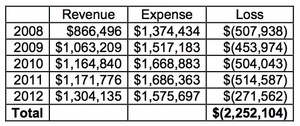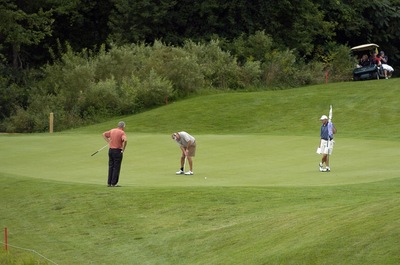Ann Arbor's two city-run golf courses have lost a combined $2.25 million over the past five years, requiring a sizable subsidy from the city's general fund.
It's due to that kind of financial performance that the city's golf course enterprise fund has been on a five-year deficit elimination plan with the state of Michigan.
City officials believe they've made strides operationally and financially at the Huron Hills and Leslie Park golf courses in recent years, but they still haven't completely eliminated the deficit.
After reimbursements from the city's general fund for prior year losses, the golf fund's net cumulative deficit as of June 30 was still $164,436.

The city of Ann Arbor's golf course enterprise fund has been losing money for years, requiring subsidies from the city's general fund.
Source: City of Ann Arbor
That means the golf budget will be included as part of the city's nearly $80 million general fund budget that pays for core services like police and fire protection.
The Ann Arbor City Council voted 10-1 Monday night to approve a new deficit elimination plan for the golf fund and the city's airport fund, which had an unrestricted net asset deficit of $595,250 as of June 30.
City Administrator Steve Powers said the plan is required by the state, but the City Council still could decide later to go in another direction if it wants. Its hands aren't tied by the plan.
"This is something we have to submit to the state because we are up against a deadline," he said of the approved plan. "It's very much a technical submission to the state treasurer that identifies how Ann Arbor as a local government is going to correct the deficit in two funds."
Karen Lancaster, the city's accounting services manager, said the deficit in the airport fund is due to categorization of an internal loan for hangar improvements as unrestricted, rather than restricted. She said the airport fund overall actually has a positive net asset balance of $1.4 million.
The city's plan to eliminate the airport deficit is to continue making payments toward the loan balance, which was $943,659 as of June 30. The airport will remain a separate enterprise fund.
Based on the latest projections, the golf course fund could lose about $272,000 in fiscal year 2012-13 and that will require an equivalent subsidy from the general fund.
If the golf course operations were accounted for in the general fund — using a different accounting standard, which eliminates certain charges and adds others — the loss would have been about $247,000, or $25,000 less, according to the city's administration.
Looking forward, city officials believe moving golf operations into the general fund will save $20,000 per year for the general fund on an accounting basis through fiscal year 2014-15. After that, the savings per year is expected to increase by $120,000 due to the golf fund's debt being paid off.

The Leslie Park Golf Course during sunnier weather.
Lon Horwedel | AnnArbor.com
Council Member Mike Anglin, D-5th Ward, was the only one to vote against the deficit elimination plan, expressing fears about moving the golf operations into the general fund.
"My fear is that when we move them back into the general fund, they become part of the parks system," Anglin said. "The parks system is stressed, to say the least. And what will happen is, in order to fund further items in the parks, we're going to have problems sustaining the golf courses."
Sumedh Bahl, the city's community services administrator, said golf courses are city parks and he doesn't see it as a burden for the general fund to absorb them.
Council Member Jane Lumm, an Independent who represents the 2nd Ward, said she's glad to see the bottom line financial performance of both golf courses improving.
"At Huron Hills, for example, the revenue for fiscal year '12 is about $370,000, which is an impressive increase of 62 percent compared with fiscal year '08," she said.
Moving the two courses to the general fund makes sense, Lumm said, since golf is a recreation activity. She said the city's other recreational facilities and activities are in the general fund and it never seemed logical that the city's two golf courses should be treated differently.
Without counting about $20,000 in what she called "central costs," Lumm said Huron Hills lost about $145,000 last year and Leslie Park lost about $105,000.
Mayor John Hieftje said he thought Lumm did a good job summing up the work the city has done to improve the golf courses both operationally and financially. He said he's hopeful there will be a day in the not-too-distant future when golf revenues and expenditures break even.
"The city's efforts in bringing the golf courses back up to a point where we can see them getting to a break-even point have been genuine and a lot of hard work has been done," he said.
Council Member Stephen Kunselman, D-3rd Ward, noted there are no operational impacts to the golf courses by accounting for them in the general fund.
"We're not going to be taking monies from the golf courses and providing it to the canoe liveries or other operations, so I think we're on the right track," he said.
Ryan J. Stanton covers government and politics for AnnArbor.com. Reach him at ryanstanton@annarbor.com or 734-623-2529. You also can follow him on Twitter or subscribe to AnnArbor.com's email newsletters.